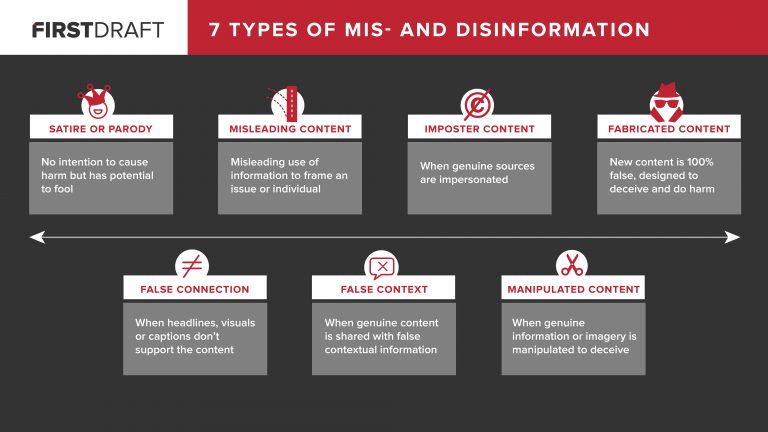
Loosely defined, misinformation is false information, no matter whether the creator or sharer of that information intended to mislead or not.

"7 Types of Mis- and Disinformation" by First Draft is licensed under CC BY 4.0 DEED.
Source: “Why people fall for misinformation - Joseph Isaac” by TED-Ed: "In 1901, David Hänig published research that led to what we know today as the taste map: an illustration that divides the tongue into four separate areas. It has since been published in textbooks and newspapers. There is just one problem: the map is wrong. So how do misconceptions like this spread, and what makes a fake fact so easy to believe? Joseph Isaac dives into the world of misinformation. [Directed by CUB Animation, narrated by Addison Anderson, music by József Iszlai]." (description from TED-Ed website)
| term | definition | source |
| bias | a) an inclination of temperament or outlook; especially: a personal and sometimes unreasoned judgment : PREJUDICE; b) an instance of such prejudice |
Merriam- Webster Dictionary |
| clickbait | an internet story, title, image, etc. that is intended to attract attention and encourage people to click on a link | Cambridge Dictionary |
| confirmation bias | people’s tendency to process information by looking for, or interpreting, information that is consistent with their existing beliefs. | Britannica |
| crisis actor |
a professional or volunteer actor who plays a role in a staged drill in order to prepare or train first responders for a specific emergency scenario; or (in a false flag conspiracy theory) a person pretending to be a victim in a hoax attack. |
Dictionary.com |
| deepfake | any of various media, esp. a video, that has been digitally manipulated to replace one person's likeness convincingly with that of another, often used maliciously to show someone doing something that he or she did not do. | Oxford Languages |
| disinformation | deliberately misleading or biased information; manipulated narrative or facts; propaganda | Dictionary.com |
| filter bubble | an environment and especially an online environment in which people are exposed only to opinions and information that conform to their existing beliefs | Merriam- Webster Dictionary |
| go viral | if a video, image, or story goes viral, it spreads quickly and widely on the internet through social media and email. | Collins Dictionary |
| misinformation | incorrect or misleading information | Merriam- Webster Dictionary |
| parody | a literary or musical work in which the style of an author or work is closely imitated for comic effect or in ridicule | Merriam- Webster Dictionary |
| satire | a poem or (in later use) a novel, film, or other work of art which uses humour, irony, exaggeration, or ridicule to expose and criticize prevailing immorality or foolishness, esp. as a form of social or political commentary. | Oxford Languages |
| troll | a troll is Internet slang for a person who intentionally tries to instigate conflict, hostility, or arguments in an online social community. | GCF Global |
Disclaimer: This website includes links to non-PPLD websites and services. PPLD cannot control the content or functionality of non-PPLD websites or services nor endorse the accessibility or accuracy of those sites. Users should use critical judgment in relying on information found in these resources and determine what information is appropriate to their needs.
This website also links to documents that may not be fully accessible, documents can be made accessible by request. Please visit our Accessibility page for more information.